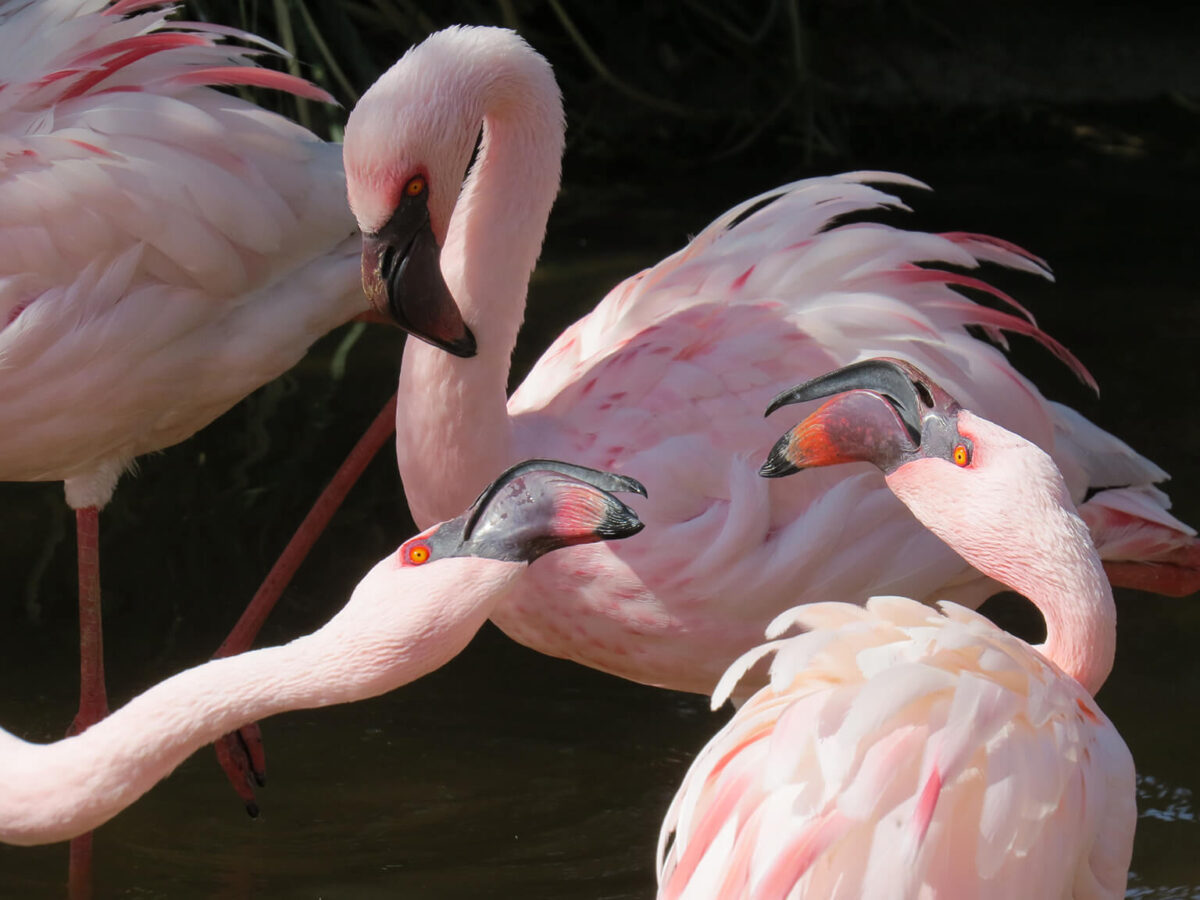Words by Johanna Harlow
Going on safari doesn’t require a trip to Africa—it doesn’t even require a plane ticket. With just a two-hour drive north, you can commune with giraffes, zebras and cheetahs on a wildlife preserve in Santa Rosa.
Safari West, dubbed “the Serengeti of Sonoma,” is home to nearly 1,000 animals—from kookaburras to kudus, bongos to buffalo. Rather than encounter these majestic creatures behind bars, guests jump in jeeps with a guide to meet them on their own turf. After a ride through the rolling hills and oak-studded woodlands of this 400-acre property, explorers have the option to extend the adventure with an overnight stay.
Ready for a walk on the wild side? Pull on your pith helmets (or your baseball caps) and away we go!
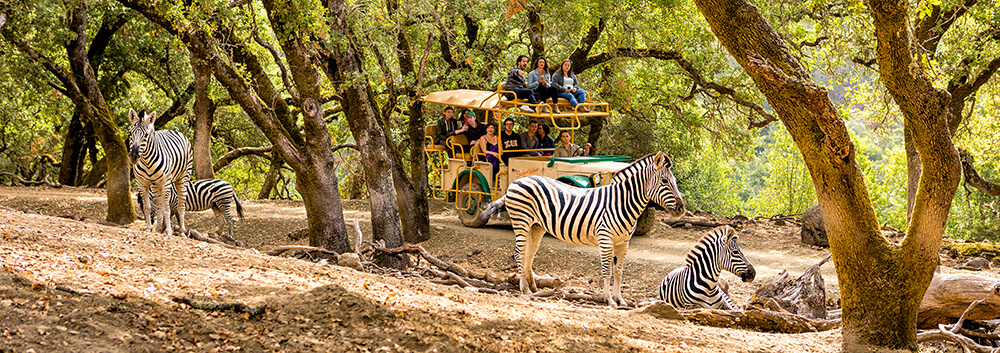
Photo: Courtesy of Ray Mabry / Cover Photo: Courtesy of Cheryl Crowley
A Wild History
After watching films like George of the Jungle and Jumanji, who doesn’t hunger for a wilderness adventure? As it happens, the magical world of movie-making influenced Safari West’s origin story.
Enter the preserve’s co-founder Peter Lang. As the son of a Hollywood director, Peter grew up on television sets for shows like Daktari and Sea Hunt, where he encountered wild cats, chimpanzees and other exotic animals. At 13, Peter raised lion cubs on behalf of a film company—and
occasionally hopped on a bus with one of his young charges
for a trip to the beach.
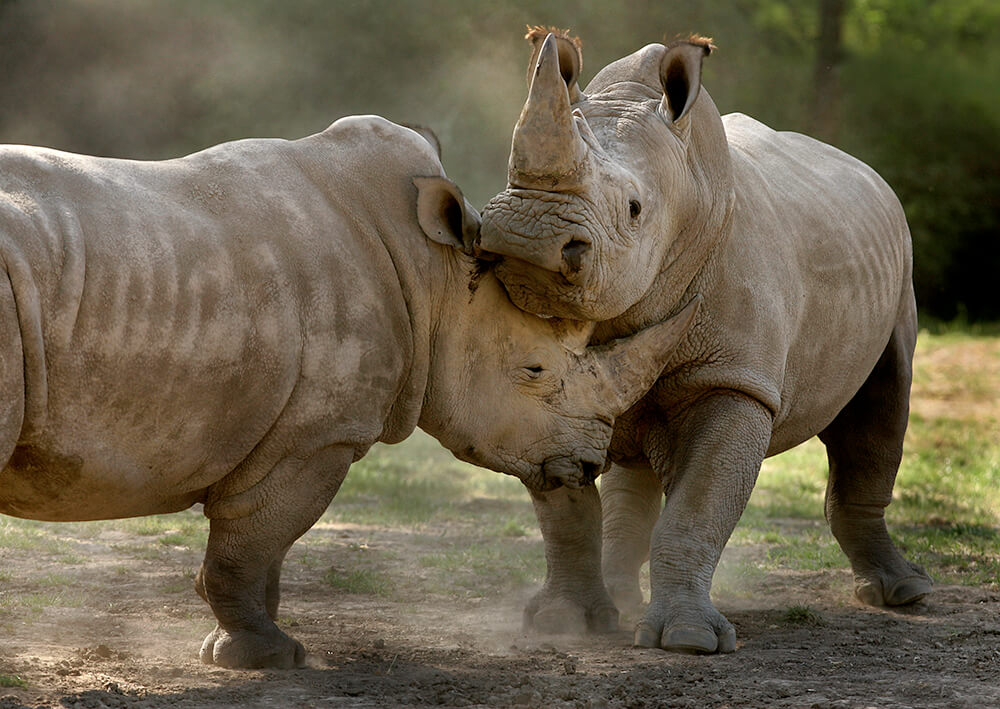
Photo: Courtesy of Sarah-Jane Tarr
After heading “the last working cattle ranch in Beverly Hills,” Peter imported a few African eland (an ox-sized member of the antelope family) to nibble down the surrounding shrubs. He later added white-striped kudu and hulking-horned Watusi cattle to his herd. After selling his ranch to the National Park Service, Peter purchased a large property in Santa Rosa and brought his herd north. There, he collaborated with zoos and wildlife preserves to create a conservation breeding facility, often for endangered species. Soon, Peter grew captivated by an avian biologist who later became his wife: Dr. Nancy Lang.
Together, these birds of a feather decided to open their Santa Rosa facility to the public. Peter contributed his entrepreneurial spirit and flair for the artistic, while Nancy applied her background as the lead curator at the San Francisco Zoo to fortify Safari West’s wildlife education and conservation focus. Their safari sanctuary has been thriving ever since.
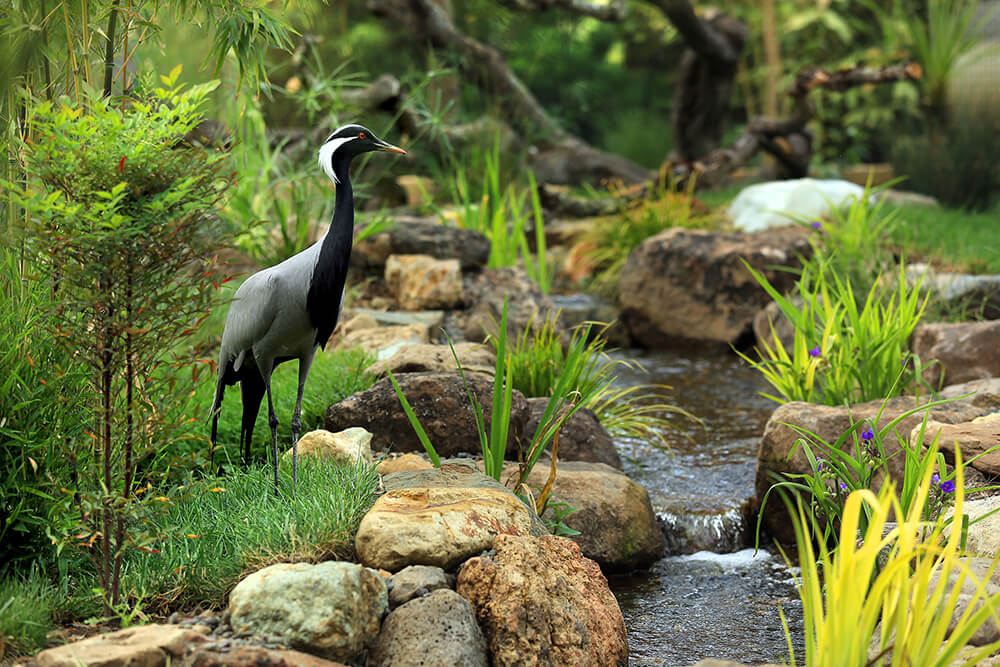
Photo: Courtesy of John Burgess
Jump in the Jeep
When I arrive at the reserve, I’m linked with a khaki-clad guide named Jeff DaSilva for a three-hour tour. Jeff wears a feather in his hat and boasts the kind of impressive tan earned from a life spent in the sun. He offers me a hand as I scramble aboard a hulking double-decker safari jeep, then swings nimbly into the driver’s seat.
As we pull onto the dirt road, we pass a trio of warthogs (one answering to the name Pig Newton). It takes all my self-control not to burst into a song from The Lion King—and the urge only intensifies as we pull into the giraffe habitat. Getting so close to these sky-high creatures is surreal. “Giraffes are kind of a weird animal,” Jeff says. “But I think that’s why we all like them.” As if to prove his point, a towering mammal two yards away assumes a wide-legged, tripod-like stance and strains her long neck to reach the sweet, green grass far below. Next, she raises her head to the nearby tree and, snaking out a long purple tongue, wraps it around some leaves before pulling them back to her mouth. “Their tongues are 15 to 18 inches long,” Jeff notes. “A good rule of thumb is that for every foot tall a giraffe is, it has an inch longer tongue.” Apparently, a few lucky guests have received kisses from these gentle giants.
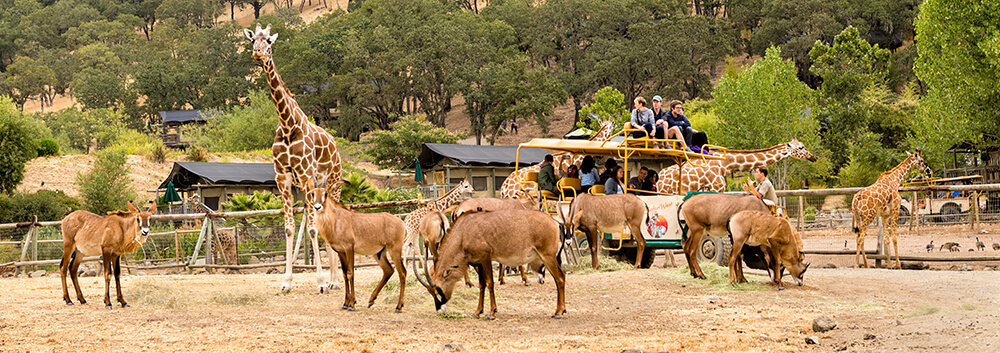
Photo: Courtesy of Ray Mabry
As we drive deeper into the property and up into the winding wooded hillsides, we rumble along a rugged road that has me channeling my inner Indiana Jones. Fortunately, the jeep handles well on this bumpy terrain and we pull into a clearing to watch a small herd. The zebras among them are easily recognizable. “People sometimes think of the zebra as a horse,” Jeff says, but there’s another species they’re more closely related to. “That’s a stripey African donkey.” He identifies the other species as the common eland. “The males can get up to 2,000 pounds when they’re full-grown.”
Off we go again, meeting wildebeests and cape buffalo along the way. Nearly back at the campground, an ostrich runs up and keeps pace with the jeep. Getting approached by this six-foot-tall creature with its snakelike neck and sizable beak is intimidating, but the prehistoric-looking bird seems as curious about us as we are of him, and we leave on good terms.
As we disembark, I recognize the truth of a statement on the reserve’s website: “With no script and no predictable paths, every safari is a unique experience, guided by the natural rhythms of the animals themselves.”
But our adventures aren’t yet at an end. Next, Jeff takes us on a walking tour of the enclosures that house the reserve’s cheetahs, hyenas and lemurs, as well as the walk-through aviary. Brilliant scarlet ibises parade past, as do African spoonbills with their utensil-shaped beaks. Jeff points out a hamerkop. Apparently, this bird is a compulsive nest builder, constructing multiple abodes before choosing the ideal place to start a family. “The male can’t sing, he can’t dance, so he builds her a few homes,” he jokes.
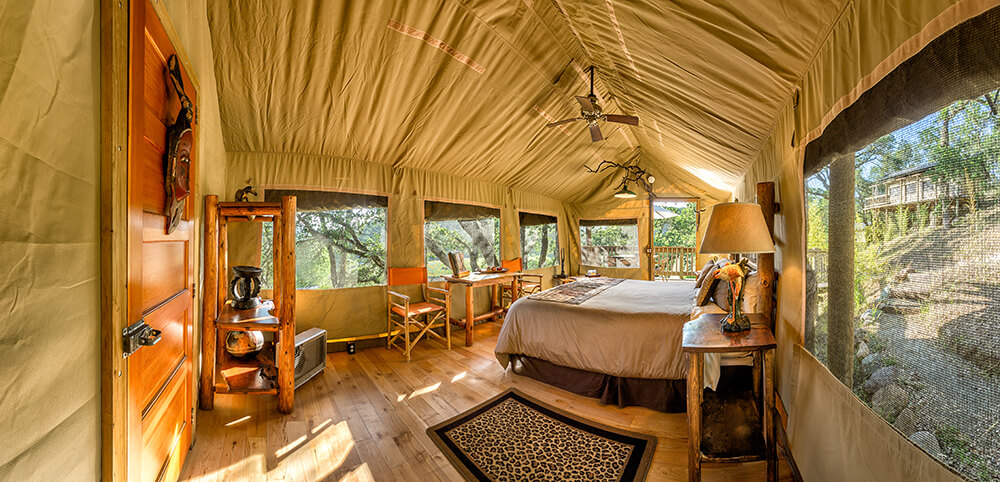 Photo: Courtesy of Ray Mabry
Photo: Courtesy of Ray Mabry
Sweet Safari Dreams
After our tour, we get settled in our room. Safari West offers the full glamping experience with 30 luxury cabin tents imported from Botswana. Elevated on raised hardwood platforms, each “room” includes electricity, a heater, tribal decorations and a bathroom complete with a shower. The furniture was built by Peter himself. As I unpack, I fold down flaps in the canvas walls for views of bamboo and the nearby giraffe habitat.
Dinner is a no-frills affair, but the 12-hour brisket, mac and cheese, smoked chicken and saffron rice is the kind of hearty meal that hits the spot after a long day. Meat is roasted over a wood-fired grill in the spirit of a South African-style braai cookout.
I buy a bottle of wine from the gift shop and take it back to my tent to enjoy a glass on the deck under the starry night sky. It’s a wonderfully wild way to spend the weekend.
WILD NIGHTLIFE - The flamingos have a lot to say… all night long. Request a complimentary pair of ear plugs from the check-in desk or bring your own to ensure a sound night’s sleep.


